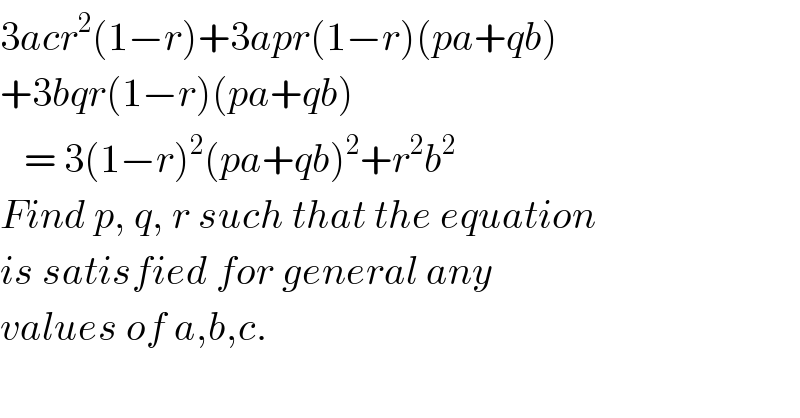
Question Number 78762 by ajfour last updated on 20/Jan/20

$$\mathrm{3}{acr}^{\mathrm{2}} \left(\mathrm{1}−{r}\right)+\mathrm{3}{apr}\left(\mathrm{1}−{r}\right)\left({pa}+{qb}\right) \\ $$$$+\mathrm{3}{bqr}\left(\mathrm{1}−{r}\right)\left({pa}+{qb}\right) \\ $$$$\:\:\:=\:\mathrm{3}\left(\mathrm{1}−{r}\right)^{\mathrm{2}} \left({pa}+{qb}\right)^{\mathrm{2}} +{r}^{\mathrm{2}} {b}^{\mathrm{2}} \\ $$$${Find}\:{p},\:{q},\:{r}\:{such}\:{that}\:{the}\:{equation} \\ $$$${is}\:{satisfied}\:{for}\:{general}\:{any} \\ $$$${values}\:{of}\:{a},{b},{c}.\: \\ $$
Commented by ajfour last updated on 20/Jan/20

$${real}\:{values}\:{are}\:{required},\:{any} \\ $$$${method}\:{to}\:{this}\:? \\ $$
Answered by mr W last updated on 20/Jan/20
![3r^2 (1−r)ac+3p^2 r(1−r)a^2 +6pqr(1−r)ab+3q^2 r(1−r)b^2 =3p^2 (1−r)^2 a^2 +[3q^2 (1−r)^2 −r^2 ]b^2 +6pq(1−r)^2 ab 3r^2 (1−r)=0 ⇒r=0 or 1 3p^2 r(1−r)=3p^2 (1−r)^2 ⇒r=0,p=0 or r=1,p=any 3q^2 r(1−r)=3q^2 (1−r)^2 −r^2 ⇒r=0,q=0 or r=1,q=impossible 6pqr(1−r)=6pq(1−r)^2 ⇒r=p=q=0 ⇒only possibility is p=q=r=0.](Q78783.png)
$$\mathrm{3}{r}^{\mathrm{2}} \left(\mathrm{1}−{r}\right){ac}+\mathrm{3}{p}^{\mathrm{2}} {r}\left(\mathrm{1}−{r}\right){a}^{\mathrm{2}} +\mathrm{6}{pqr}\left(\mathrm{1}−{r}\right){ab}+\mathrm{3}{q}^{\mathrm{2}} {r}\left(\mathrm{1}−{r}\right){b}^{\mathrm{2}} \\ $$$$=\mathrm{3}{p}^{\mathrm{2}} \left(\mathrm{1}−{r}\right)^{\mathrm{2}} {a}^{\mathrm{2}} +\left[\mathrm{3}{q}^{\mathrm{2}} \left(\mathrm{1}−{r}\right)^{\mathrm{2}} −{r}^{\mathrm{2}} \right]{b}^{\mathrm{2}} +\mathrm{6}{pq}\left(\mathrm{1}−{r}\right)^{\mathrm{2}} {ab} \\ $$$$\mathrm{3}{r}^{\mathrm{2}} \left(\mathrm{1}−{r}\right)=\mathrm{0}\:\Rightarrow{r}=\mathrm{0}\:{or}\:\mathrm{1} \\ $$$$\mathrm{3}{p}^{\mathrm{2}} {r}\left(\mathrm{1}−{r}\right)=\mathrm{3}{p}^{\mathrm{2}} \left(\mathrm{1}−{r}\right)^{\mathrm{2}} \Rightarrow{r}=\mathrm{0},{p}=\mathrm{0}\:{or}\:{r}=\mathrm{1},{p}={any} \\ $$$$\mathrm{3}{q}^{\mathrm{2}} {r}\left(\mathrm{1}−{r}\right)=\mathrm{3}{q}^{\mathrm{2}} \left(\mathrm{1}−{r}\right)^{\mathrm{2}} −{r}^{\mathrm{2}} \:\Rightarrow{r}=\mathrm{0},{q}=\mathrm{0}\:{or}\:{r}=\mathrm{1},{q}={impossible} \\ $$$$\mathrm{6}{pqr}\left(\mathrm{1}−{r}\right)=\mathrm{6}{pq}\left(\mathrm{1}−{r}\right)^{\mathrm{2}} \Rightarrow{r}={p}={q}=\mathrm{0} \\ $$$$ \\ $$$$\Rightarrow{only}\:{possibility}\:{is}\:{p}={q}={r}=\mathrm{0}. \\ $$
